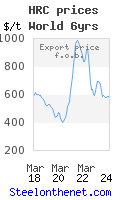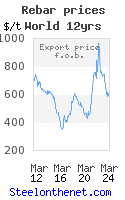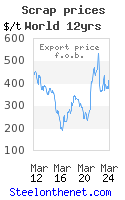Chinese and other threats to European Rebar Producers
The following extract is from an ISSB discussion about future threats to European producers of steel rebar.
Deformed Rebar is a very important product for certain European long product producers. After Turkey and Ukraine , the other countries in the top five exporters list are the Southern European nations of Italy , Spain and Portugal Algeria is the most important export market for each of these countries with Italy Italy and about two thirds of exports from Spain
Southern European producers enjoy a fairly unique situation in Algeria as a 2005 agreement between Algeria and the EU permits free trade between the two regions and Algeria imposes an import duty on shipments from the dominant player in the market, Turkey
In a situation familiar in other parts of the world, Chinese rebar producers have identified an opportunity in Algeria and Chinese exports of all HR bars to the country have increased from 131 tonnes in 2013 to 345,000 tonnes in 2015 and a further increase so far in 2016. This already seems to have had the effect of displacing Spanish and Portuguese tonnage as exports from Spain have fallen by 440,000 tonnes in the same period whilst shipments from Portugal
The long-term threat may not actually be coming from China
On the supply side, Tosyali Algerie has a 500,000 tonne a year rebar mill which started production in 2013 and has initiated an expansion to nearly double its steelmaking capacity, although a timeline for the project has not yet been announced. The old Arcelor Mittal plant, which passed into the government's hands in October has a 400,000 tonne per year rebar mill and it is looking to add another long products mill with a capacity of one million tonnes by 2017. Finally, a joint venture between the state owned steel company and Qatar Steel has been initiated which is expected to have a 750,000 tonne per year rebar mill up and running by the end of 2017.
So far this year Italian exports have increased by 6% and Portuguese exports grew by 21%, offset by a 34% decline in Spanish shipments but how long can European producers hang on to this vital market given the two-pronged assault from Chinese producers and the measures taking place to grow the rebar industry within Algeria Algeria , the loss of this market would likely have profound consequences for the rebar industry in Europe .
For further information on steel-related statistics and data, visit http://www.issb.co.uk
Labels: Algerian steel demand, Chinese steel exports, European rebar producers, ISSB, rebar, rebar demand, reinforcing steel bar, Tosyali Algerie



